March 24, 2024
First Unitarian Universalist Society Burlington
Part I
For my message today, I am indebted to individuals far more informed on this topic than I: Jason Stanley, a professor at Yale and the author of How Fascism Works; another Yale professor: Timothy Snyder and his book, On Tyranny. Also, my colleague, Rev. Dr. Cecilia Kingman, who has spent her professional life studying authoritarian systems. I express my gratitude to be able to learn from their brilliance and, in no doubt flawed ways, pass some of it onto us as a gathered community.
Can we all just acknowledge the obvious: a twenty-minute (plus) sermon divided into two halves barely touches the topic of how we come to embody fierce love to resist fascism?
This heavy topic intrinsically discusses systemic harm. Those of us with marginalized identities are disproportionately impacted by the forces of fascism in our midst. We need not look further than the many states looking to legislate health care by targeting gender-affirming care for our trans kids to know this. So my invitation to you: take care of yourself.
For those of us with trauma histories, this topic can be activating. For those of us breathing, this is simply an upsetting subject. Do what you need to do – including moving your body, or checking out, or taking notes – to take care. You do not need my permission, but you have it anyway. Think of it moving your body not only to regulate your nervous system, if that’s what you need, but to practice freedom, which is something we, fierce lovers who are resisting fascism, must also do.
I also want to acknowledge that because of my social location – my whiteness, my relative-resourced-ness, my marriage with its heterosexual privilege – protections that are afforded me can block me from seeing or fully realizing the depth of the dangers of fascism of our times.
All those words might seem like they are a preface, a getting ready for the main thing, but let me tell you – tending to each other, noticing our social location and how that impacts our understanding, creating trauma-informed space – these are forms of the very resistance of which I speak; these is how we build trust and resilience necessary to sustain ourselves in opposition to fascism. Resilience happens, to paraphrase adrienne maree brown, at the “speed of trust.”

There is an ever-enlarging club of back-sliding democracies on this planet; these United States is one of them. Fascism is not coming. Fascism is here.
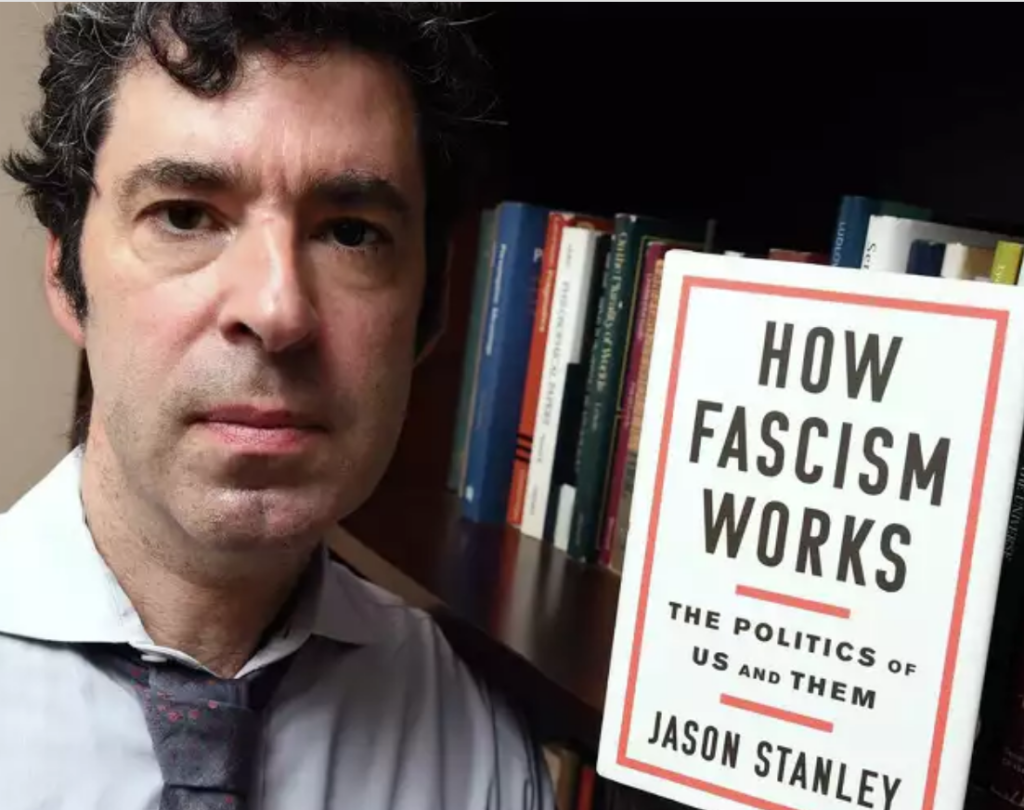
When we hear the ten traits that Jason Stanley puts forward in his book, How Fascism Works, this becomes clearer. Stanley, the child of Holocaust survivors, states that these traits together constitute fascism – while discrete, they are not separate; it is only when they are bundled together that we see a system of fascism emerging.
What do I mean when I use the word fascism? Let’s start with the standard definition, which is “a mass political movement that emphasizes extreme nationalism, militarism, and the supremacy of both the nation and the single, powerful leader over the individual citizen.” Stanley defines fascism not only as an ideology, but as a political method. This means that we can recognize fascists not necessarily by their beliefs, but by their methods. This means that there are people who use fascist methodology who do not necessarily hold fascist beliefs.
I am going to name all ten of Stanley’s traits, but explore just a few.
MYTHIC PAST
PROPAGANDA
CULT of anti-Intellectualism
UNREALITY
HIERARCHY
VICTIMHOOD
LAW AND ORDER
SEXUAL ANXIETY
SODOM & GOMORRAH
ARBEIT MACHT FREI (Work Shall Make You Free)
To start with that last one, given its potentially-traumatizing phrasing: given Stanley’s family’s history, there is intentionality in naming this trait with the phrase that was on the gate at Auschwitz. With it, he names that fascists favor forced labor – as punishment in prison or work requirements for accessing public assistance.
Sodom and Gomorrah is less about the Biblical tale and more about using the urban/rural divide as a wedge, often playing on the value of labor, dividing those who are hard workers and thus legitimate and those who are lazy or are stealing jobs.
The sexual anxiety piece is fascinating. I don’t know about you, but it resonates strongly for me. Whether it’s about traditional gender roles along the binary, or it’s about discarding the binary altogether, fascist methodology plays on the fear that women and children need to be protected from (fill in the blank: racial impurity, transgender aggressors in restrooms, fair sports competition, …), and that protection is provided by a big, strong (cis) man, often a big strong man who is the actual reason to be afraid.
While they all work together like an interlocking puzzle, there is a special synergy that happens between Hierarchy and Victimhood. I’m quoting my colleague, Cecilia Kingman, here: “Once you have convinced people that they are justifiably higher in the hierarchy, then you can convince them that they are victims of equality.”
Let that sink in. This is why the freedom of others (teaching a history that freely tells the truth about slavery or Jim Crow) becomes a threat to anyone who has experienced a privileged social location. Someone else’s access to freedom and self-actualization outside of conformity feels like a threat. And we in this room are not immune, for this dance between hierarchy and victimhood is insidious.
And finally, naming the trait of Unreality, Jason Stanley states it baldly: “If you are going to rip the heart out of democracy, you get people used to lies.”

That’s heavy stuff. Worthy of a breath and checking in with our nervous system to see how we are doing. Perhaps a shake of the head or shoulders to release the build up of tension.
In the second part of the sermon, I’ll talk about some of the twenty lessons from historian Timothy Snyder. There is something comforting about having twice as many lessons to inform how to love fiercely as we resist fascism.

Part II

When I say the phrase, My Little Pony, can you call to mind an animated show from the 2010s that, as all popular shows seem to do, spawned an array of small plastic objects called toys in an array of pastel shades? Despite the plastic, and despite the consumerism, My Little Pony sounds mostly innocuous, doesn’t it?
I’m preaching about fascism and you must be thinking that I have taken a very wrong.
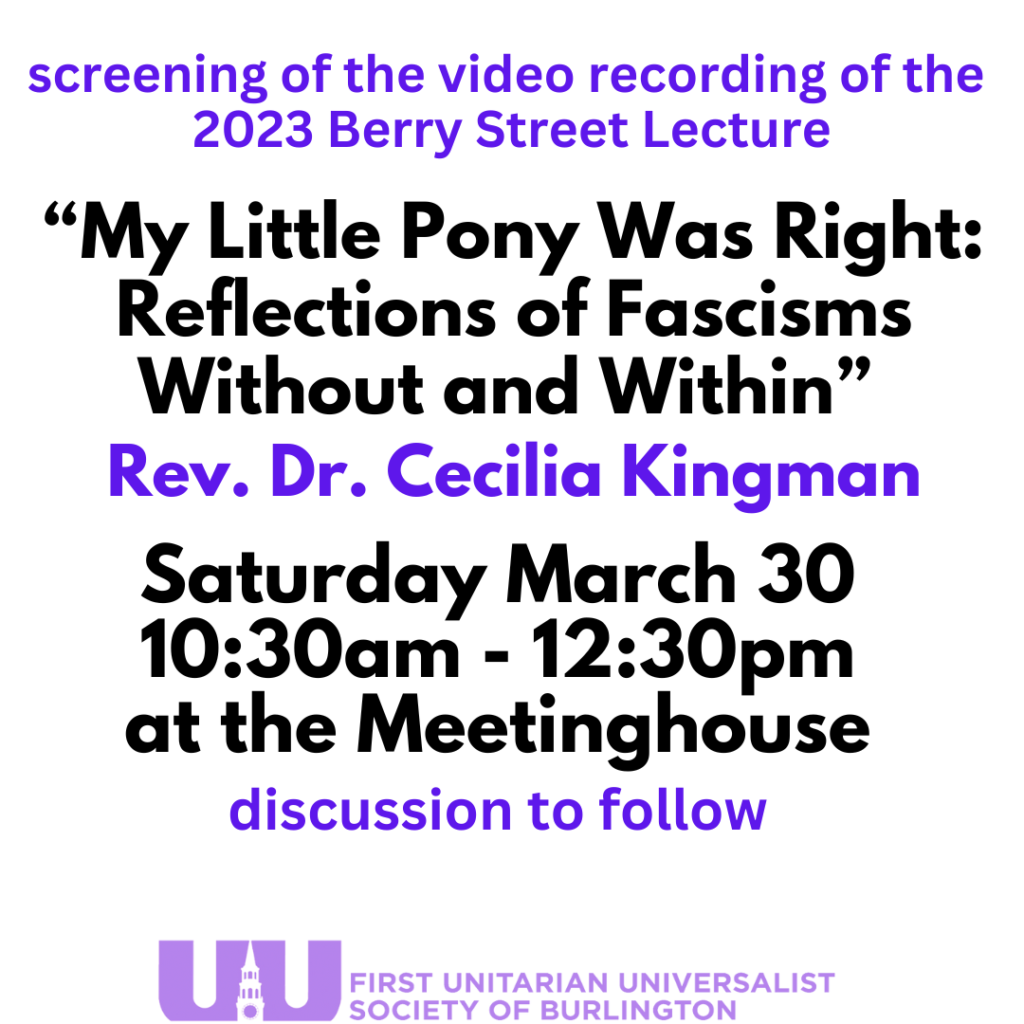
My colleague, Rev. Dr. Cecilia Kingman, gave last year‘s Berry Street lecture, the 202nd of its kind. This annual lecture, given by a Unitarian Universalist minister, takes place at the end of the ministers’ annual professional meetings. This past year, Rev. Kingman, given that she has studied this for decades, lectured on fascism within and without. Her lecture, for which I was present at the time, and to which I re-listened just this past week, is frightening, inspiring, and informative.
For any UU who is concerned about the health of our democracy, I think it should be a requirement to listen to. It is available online to anyone who wants to watch the video, or read the text. And next Saturday morning, we are showing it here in the Meetinghouse, with some time for discussion afterwards. If you come, you can learn about the connection between My Little Pony and resisting fascism.

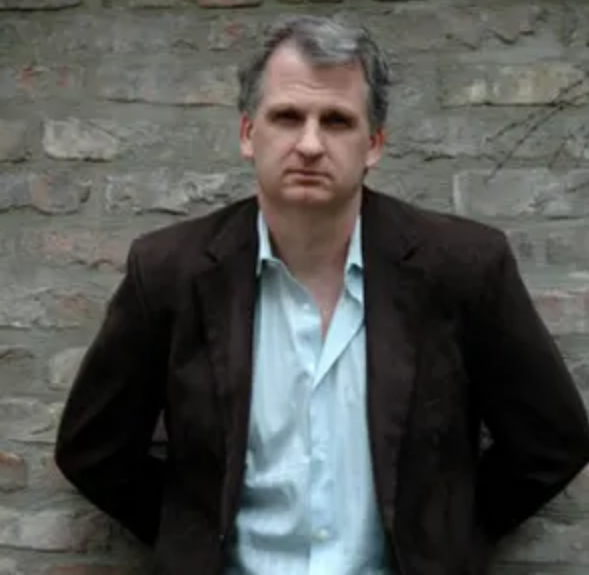
A week after the 2016 election day, Timothy Snyder, a professor of history at Yale, wrote a long post on Facebook about ways we can and should respond to the rise of authoritarianism. In short order, that post was expanded and became this handbook: On Tyranny: Twenty Lessons from the Twentieth Century. It begins with this sentence:
“History does not repeat itself, but it does instruct.”
I won’t name all 20 lessons. I cannot even speak to you about all the ones I want to tell you about – but I urge you to familiarize yourself with them and talk with others about them.
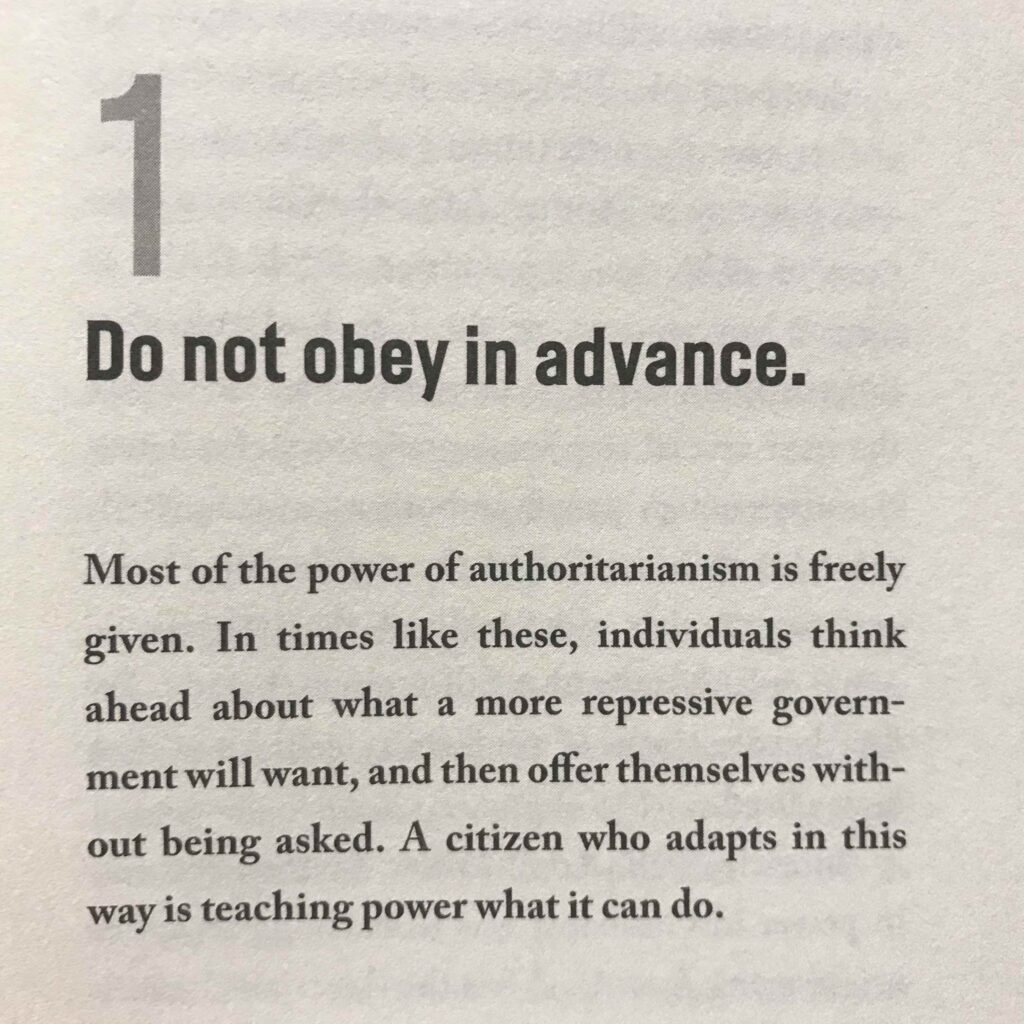
Number One: Do Not Obey In Advance. This is what Snyder calls “anticipatory obedience.” It’s a form of self-censorship. He says that it teaches those who would abuse power just what they can get away with. For me, a concrete example was the conversation I had with myself about choosing the current message on our wayside pulpit – the message board along the sidewalk on Pearl Street. It says “Fierce Love: Resist Fascism.” And I had to talk myself into it because I worried about hateful vandalism. Choosing not to post the title of the sermon because of the fear of violence would have been a form of anticipatory obedience.
Number Two: Defend Institutions. Snyder says that institutions do not protect themselves. “Do not speak of ‘our institutions’ unless you make them yours by acting on their behalf.” He encourages us to choose an institution we care about and support it, actively: He names: “a court, a newspaper, a law, a labor union” and to that list I add, this place, this people, this congregation.
I don’t want to have to mention Number Six ~ Be Wary of Paramilitaries ~ but given the arrest this week of Daniel Banyai and the presence, even with the intention to dismantle it, of the paramilitary training facility known as Slate Ridge in Pawlet, it seems necessary. Snyder writes something you already know: “when the men with guns who have always claimed to be against the system start wearing uniforms and marching with torches and pictures of a leader, the end is nigh. When the pro-leader paramilitary and the official police and military intermingle, the end has come.”
Number Eight: Stand Out. Freedom threatens the power that a fascist system hoards. Standing out sabotages the fascist obsession with conformity. Snyder describes this lesson as “It can feel strange to do or say something different. But without that unease, there is no freedom. Remember Rosa Parks. The moment you set an example, the spell of the status quote is broken, and others will follow.”
Of course I include this one. I mean, look at my hair.

Earlier this week I attended a webinar at UVM with the speaker, Megan Red-Shirt Shaw, a member of the Oglala Sioux who shared that at the University of South Dakota, they had just taken away the right of employees to share, in their email signatures, their tribal affiliation. This is part of the larger pressures, harsher on BIPOC folx, to not stand out. It is worthy of her, and our, fierce love to resist it.

This is why next Sunday, we will find a way to recognize in our Sunday service Transgender Day of Visibility – “standing out” for our unabashed solidarity. Because it is the right thing to do. Because it places love at the center. Because it is a form of fierce love that resists fascism, the violence of which is being visited upon our trans and nonbinary siblings and cousins disproportionately.

Now I hate Small Talk. But given that it’s Number Twelve on his list, along with making eye contact, I figure that I can get over my discomfort because, as Snyder says, not only does it make me a better citizen, it helps us “stay in touch with [our]surroundings, to break down barriers, and to understand whom [we] should and should not trust.” Fierce love as small talk? Okay, I’m willing to give it a try. How about you?
Related to this is Number Thirteen: Practice Corporeal Politics. He says, “Place your body in unfamiliar places with unfamiliar people.” I say: whenever you can, come to Sunday services in person, in your body with other bodies, and be sure to spend some of your time talking to someone you do not know or know well. Show your fierce love in this way.
As if these other haven’t be, these lessons are sobering:
Number Eighteen: Be Calm When the Unthinkable Arrives.
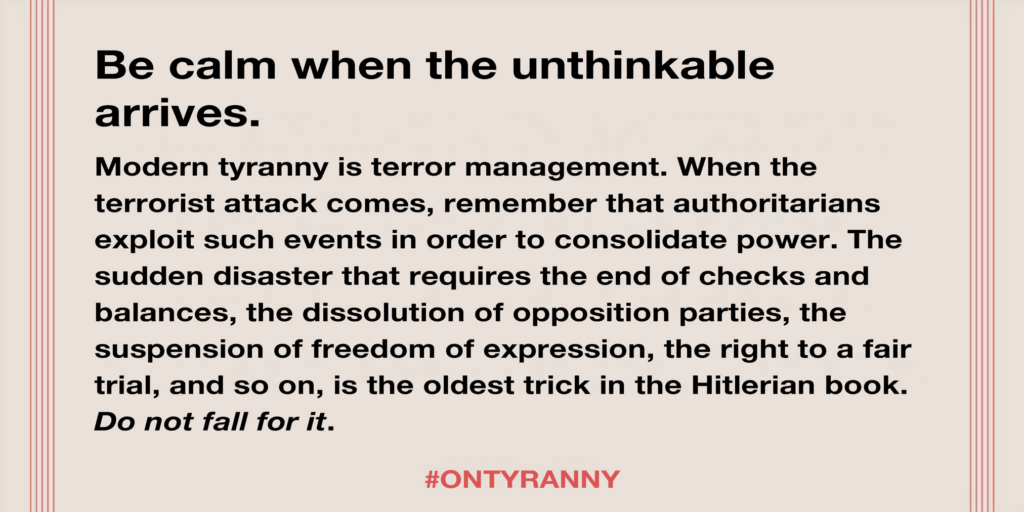
And lastly, Number Twenty, which isn’t a chapter with text, but just these sobering words: Be as Courageous As You Can: if none of us is prepared to die for freedom, all of us will die under tyranny.

While there are blessings that abide in this time ~ like medical remedies for things that would have killed us last century ~ there is sufficient reason to curse, like Hamlet, the time we live in and that it falls to us to set it right.
When I am feeling that particular tension, I call to mind a passage from the author, Clarissa Pinkola Estes, which I share here in part:
Ours is not the task of fixing the entire world all at once, but of stretching out to mend the part of the world that is within our reach. …What is needed for dramatic change is an accumulation of acts, adding, adding to, adding more, continuing. … To display the lantern of soul in shadowy times like these — to be fierce [is a] greatest necessity […] When a great ship is in harbor and moored, it is safe, there can be no doubt. But that is not what great ships are built for.
While in 2007, the clowns non-violently confronted the KKK in Knoxville as our Time for All Ages story informed us, on inauguration weekend, 2017, someone punched Nazi Richard Spencer. The video went viral. The act raised an age-old ethical question whether violence is acceptable as a form of resistance against evil. If there’s one message that you take away from today’s sermon, I want it to be that there are many ways to have the fierce love necessary to resist fascism. You might choose to punch a Nazi, but if not, that’s okay because there are other ways, small and large, that we can let loose on the world our fierce love for a just and equitable democracy.
Let us be a flotilla of great ships that leave the safety of a harbor.
Let us do what is ours to embody a fierce love that resists fascism.
Let us be as courageous as we can.
Let us be willing.

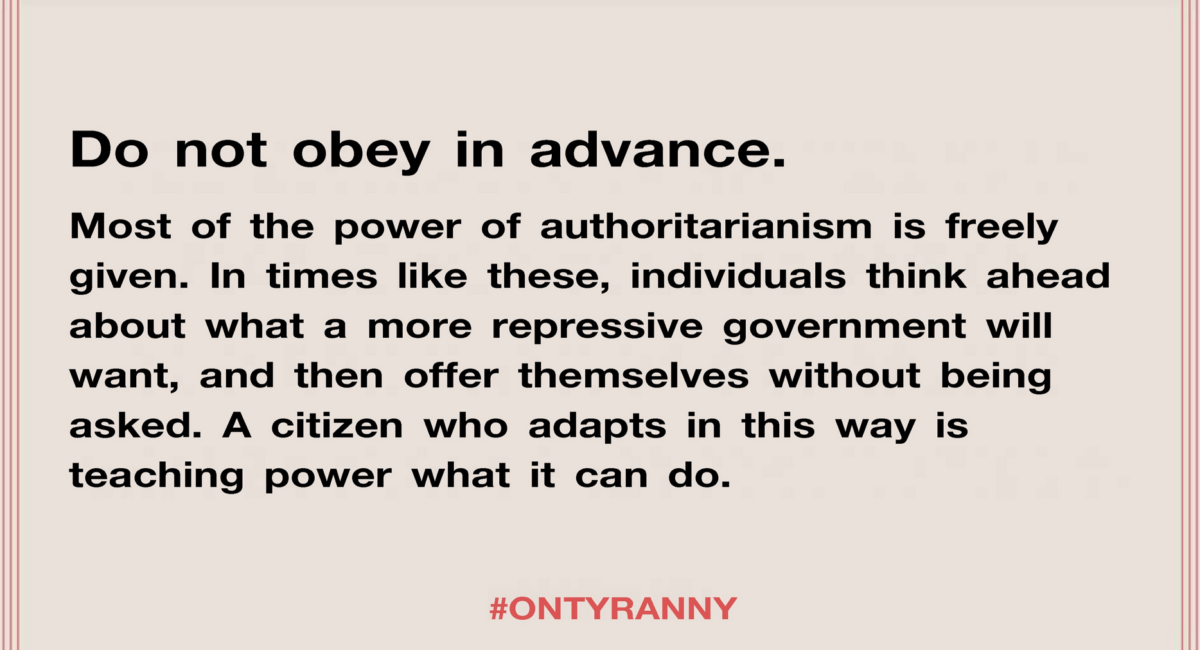
I am not sure that this is the easiest way to reach you but I’m going to try it I was very impressed with your sermon on the Sunday regardingFascism I told my table mates all about it and said that I was going to come to the talk back on Saturday. One of my table mates asked for me if he could come and I said yes. I hope this was appropriate response. He and I are both wheelchair users. I am wondering where you will hold this meeting and if it’s appropriate for us. Then right after Gordon spoke to me wanting to come another friend of mine asked her she could also come. She will drive. I would really appreciate a response to this to see if it is appropriate for me to come and bring two friends, my recollection from Sunday is that this meeting will be Saturday morning starting at 10 o’clock. How long do you expect the meeting to run .
Jeanne, I am sorry to say that I am only seeing this question/comment now, several days after it is useful. I am sorry that we missed out on having you AND your friends at the meeting. It seems that there may be future conversations – so keep an eye out on the weekly news for their announcements.